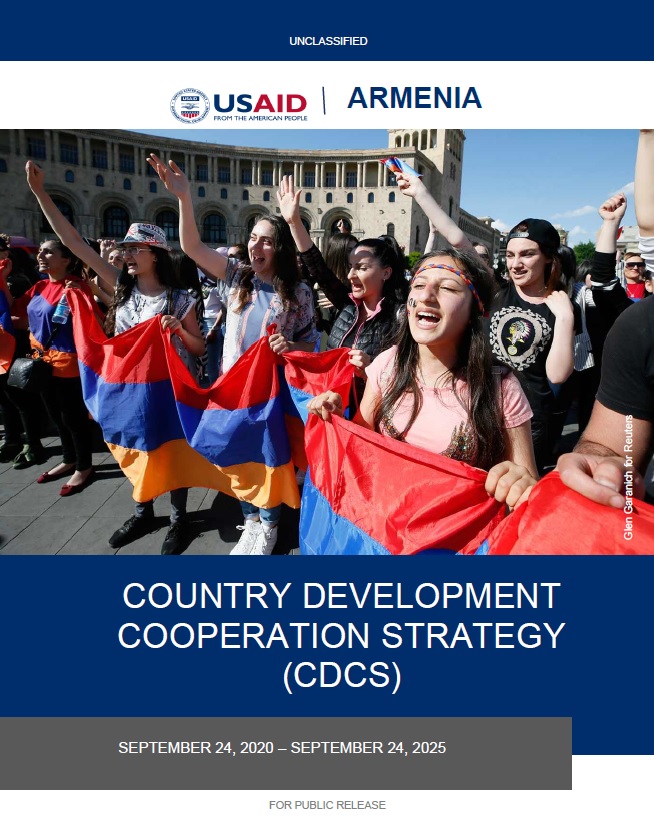Speeches Shim
Armenia has weathered a tumultuous year. The 2020 Nagorno-Karabakh conflict and subsequent political instability following the November 10 ceasefire, along with widespread rates of COVID-19, have greatly tested Armenia’s political, economic, and social sector resilience. Yet despite these twin crises, and the rapidly evolving political landscape, Armenia is setting its sights on peace and stability.
The new 2020-2025 Country Development Cooperation Strategy (CDCS) outlines USAID’s strategic priorities and approaches in Armenia for the next five years. Although it was developed prior to the conflict in Nagorno-Karabakh and subsequent ceasefire agreement, the document identifies the key sectors, technical approaches, and policy considerations that will guide USAID’s work in helping Armenia rebound from recent crises. As needed, the CDCS will be adapted to new development priorities, should they arise in the coming months and years.
The CDCS incorporates analysis of Armenia’s Capacity and Commitment as outlined in the Journey to Self Reliance Roadmap (J2SR) and is closely aligned with Armenia’s goals and priorities. USAID will continue to collaborate with a variety of partners, including the Government of Armenia, local governments, civil society, the private sector, and private individuals throughout the country to achieve the development outcomes outlined in the CDCS.
Through this new strategy, USAID reaffirms its commitment to Armenia and the Armenian people as strong, reliable development partners that support the pursuit of democratic stability, economic prosperity, and an engaged citizenry as cornerstones of a peaceful and sovereign nation.
USAID's goal for the next five years is to build Armenia’s capacity and further its commitment to self-reliance so that it seizes the opportunity to strategically transition to a more inclusive, democratic, and economically resilient partner.
To accomplish this goal, USAID will work to achieve two Development Objectives (DOs) - to advance Armenia’s democratic transition, and enhance Armenia’s economic security. Activities and programs designed and implemented under each of these DOs will support Armenia in its development efforts and will reinforce the democratic and economic gains achieved to date. USAID support will be aligned with U.S. foreign policy priorities and will address notable J2SR gaps by supporting key government reforms, including judicial reform, anti-corruption, public sector effectiveness, reform of the business environment, improvements to economic governance, progress on export sophistication in targeted high-growth sectors, and a concerted effort to narrow Armenia’s economic gender gap. All of USAID’s programming is designed to support Armenia's Journey to Self-Reliance and ensure Armenian partnership during implementation -- and ownership, upon completion of programs. Further, as currently designed, each DO is flexible enough to accomodate programmatic changes that may become necessary as a result of the 2020 Nagorno-Karabakh conflict and the ongoing COVID-19 pandemic.
Development Objective 1: Advancing Democratic Transition
To support Armenia’s path to democratic reform, USAID will build the capacity of government, civil society and citizens to strengthen rule of law, political representation and competition, and implement democratic reforms, as well as strengthen independent media to engage and inform citizens. These efforts will help to institutionalize effective and accountable governance and will promote enhanced citizen engagement and participation. USAID will advance inclusive development and empower citizens, particularly women, youth, and other traditionally marginalized populations, to effectively engage and participate in the governance of their country. Ultimately, all of USAID’s efforts to achieve this Objective are focused on supporting the consolidation of key democratic reforms and institutions, and on ensuring that these reforms translate into concrete, tangible improvements in the lives of Armenian citizens and communities.
To accomplish this effort, USAID will partner with the executive, legislative, and judicial bodies of the Government of Armenia; political institutions; civil society; media; and the private sector to ensure that political will and citizens’ voices are translated into meaningful, institutional reforms that promote effective, accountable, and inclusive governance.
Development Objective 2: Enhancing Economic Security
To support Armenia’s economic growth and security and ensure more Armenians are able to participate in and benefit from the economy, USAID will strengthen economic governance, empower competitive sectors, and support improved natural resource management. USAID will expand capacity-building efforts in sectors with high growth potential and prepare the labor market for employment. USAID will also continue to support energy market liberalization and competitiveness.
To accomplish these goals, USAID will partner with key government institutions, the private sector, and other stakeholders to build on the political will for reform and capitalize on increased interest in investment opportunities in Armenia. The CDCS will reinforce the Government of Armenia’s priorities in this sector by strengthening government institutions, policies, systems, and skills to increase economic effectiveness; promoting greater energy independence; bolstering export sophistication; and providing valuable employment opportunities for Armenians.
Cross Cutting Themes:
USAID will integrate several cross-cutting themes that support peacebuilding and disaster prevention, preparedness and response. The CDCS will strengthen Armenia’s democratic, social, and economic resilience to foreign or domestic influence that might impede reforms or development.
USAID will integrate these cross-cutting themes into its programming to strengthen the resilience of the Armenian people, particularly young and emerging leaders, the government, and the private sector so they can better adapt to the changing domestic and international context. Programs and activities will also support Armenia’s efforts to address the post-2020 Nagorno-Karabakh conflict landscape and the ongoing COVID-19 pandemic.
USAID will continue to monitor the potential impact of the Nagorno-Karabakh crisis and COVID-19 pandemic and, if needed, re-evaluate the strategic approach outlined in the CDCS and make adjustments as necessary.



Comment
Make a general inquiry or suggest an improvement.